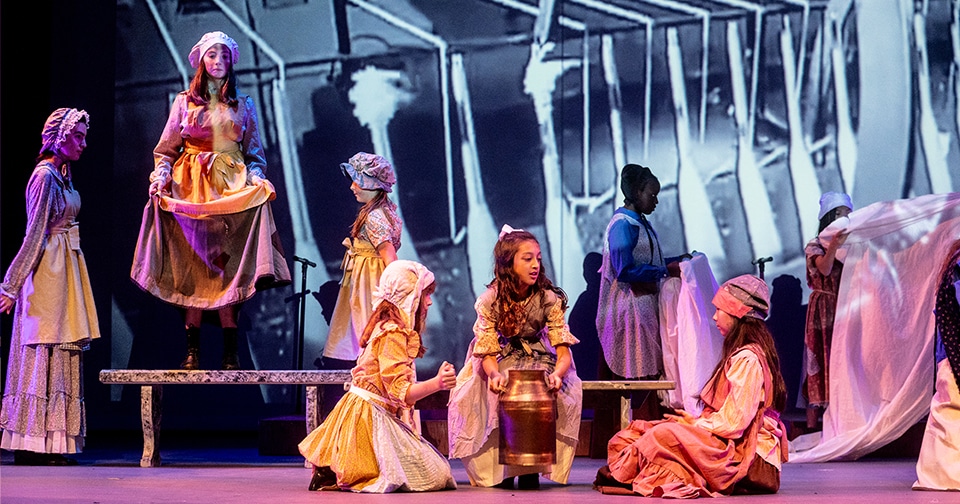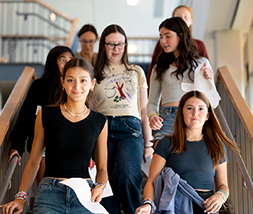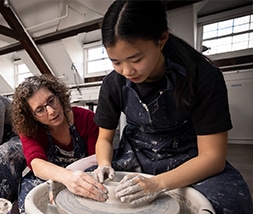“Mill Girls” Highlights Female Resilience
At the close of the Lower School Fall play Mill Girls, all of the actors hold up pictures of prominent female figures from throughout history along with the sign “nevertheless, she persisted.” The ending to the play that Winsor audiences saw was not in the script.
Developed by Adjunct Performing Arts Faculty Mary Haddad, she explained, “I wanted students to see a future for their characters…I felt like we needed a conclusion that gave the students and the audience inspiration to where things could go.” Students performed the show the weekend before the 2024 presidential election, where for the second time a woman ran for office. The final moments on stage seemed to capture the consequential sentiment of what was occurring on the political stage as well.
Written by Eliza Anderson and directed by Ms. Haddad, the production shone a light on an often-overlooked chapter of history and highlighted the resilience and spirit of female workers during the industrial revolution in a New England mill town. “I selected [the play] because I wanted the students to have a strong female-centered story with a large female-facing cast,” explained Ms. Haddad. Themes of community and female solidarity were coupled with staging techniques designed to capture the bustling and repetitive atmosphere of a 19th-century textile mill. The production brought a moment in history to life on stage, when girls and women were allowed to leave the home to work but were met with low wages, long hours, and unsafe working conditions.
“Theater is learning, it is questioning and telling a story that sometimes may be hard but is important to share—I wanted that opportunity for these amazing young people,” noted Ms. Haddad in her director’s notes from the production’s program. “Each character is multifaceted, and we encourage you to find empathy in their journeys, recognizing their hopes and dreams amidst harsh realities.”
The play features a large group of mill girls and is centered around two in particular: Octavia Brown, played by Maysa Atassi ’29, who is working at the Lowell, MA mill in an effort to save for tuition to Oberlin College, and Hannah Chaffee, played by Madeline Karczmarek ’30, who mourns her life as a girl and desperately wants to attend college like her brother, Ephraim Chaffee, played by Leomana Addo-Fung ’30. Hannah works at the mill to help pay for her brother’s tuition, and toward the end of the play tragically dies due to an accident at the mill.
“I know you’re smarter than me, everyone knows that,” says Ephraim (Leomana Addo-Fung ’30), as he pleads for his sister to come down from a tree.
“I should go, I want to go,” says Hannah (Madeline Karczmarek ’30), conveying the deep-seated longing she has for an education, as she hangs on a ladder side stage meant to be a tree.
“But you’re just a girl, Hannah,” says Ephraim defiantly, dressed in a vest, tall boots, and a colonial war hat known as a tricorne.
“I’m just a girl, it’s not fair,” says Hannah, leaning over the ladder in a modest and traditional Victorian dress with a bonnet covering her head.
Through their dialogue, you begin to see the close relationship between the brother and sister, which carries over into the rest of the play as Ephraim communicates with his sister Hannah through letters.
“Hannah has more brains then the two of you combined,” says Ephraim, as he tries to read a letter from his sister while he is tussled by friends at Harvard.
“How frightening, a girl with brains!” says Ephraim’s college friend Henry, played by Sarah Sloan ’30.
The plot vacillates between illustrating the harsh working conditions the young women face, the responsibilities the girls hold to their families, and the moral and social expectations placed on them regarding their appearances and their roles in society.
Octavia (Maysa Atassi ’29) is the wide-eyed, hard-working mill girl who believes her diligence will land her in college once she has earned enough money. “The girls study everything there that the boys do,” Octavia tells Hannah about her plans. “If you truly want something, you must set your sights.”
The stage was set minimally but impactfully as the play leans heavily on dialogue and period costumes to tell the story. A screen intermittently shows the cogs and inner workings of the machines to illustrate the loud working conditions and the repetitive nature of the daily grind on the factory floor. The conversations amongst the mill girls highlight the historical times. Despite the tough working conditions, they talk about how they prefer working in the mill to being stuck with household chores in the confines of a home. They talk of one day having the right to vote.
The play culminates with Hannah’s death on the mill floor and a strike amongst the girls when their wages are cut but their hours remain the same.
“We are not machines, yet we work like machines. From sunup to sundown 80 hours a week,” says Octavia as all the actors on the stage begin chanting, “ten-hour day,” in a sign of protest.
Ms. Haddad was drawn to put on this play for a variety of reasons, including some of the more uncomfortable moments when the dialogue is anti-immigrant, as well as anti-women. “The mill girls are not just workers; they are sisters, friends, and advocates for their own rights,” said Ms. Haddad in her director’s notes. “I chose this play as a way for students to think critically and it has brought up so many great conversations during our rehearsals.”






